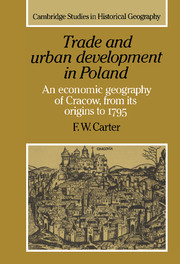Book contents
- Frontmatter
- Contents
- List of figures
- List of tables
- Preface
- Acknowledgements
- 1 Introduction: Cracow in context
- 2 Source materials and published literature
- 3 Cracow's early development
- 4 The political situation of Cracow, 1257–1500
- 5 European trade through Cracow, 1257–1500
- 6 The political situation of Cracow, 1500–1795
- 7 The commerce of Cracow, 1500–1795
- 8 Cracow: a final appraisal
- Appendix: Important dates in Cracow's history up to 1795
- Notes
- Select bibliography
- Index
- Cambridge Studies in Historical Geography
6 - The political situation of Cracow, 1500–1795
Published online by Cambridge University Press: 07 October 2009
- Frontmatter
- Contents
- List of figures
- List of tables
- Preface
- Acknowledgements
- 1 Introduction: Cracow in context
- 2 Source materials and published literature
- 3 Cracow's early development
- 4 The political situation of Cracow, 1257–1500
- 5 European trade through Cracow, 1257–1500
- 6 The political situation of Cracow, 1500–1795
- 7 The commerce of Cracow, 1500–1795
- 8 Cracow: a final appraisal
- Appendix: Important dates in Cracow's history up to 1795
- Notes
- Select bibliography
- Index
- Cambridge Studies in Historical Geography
Summary
There are many signs that the years around 1500 saw a new age dawning not only in Europe but also in other parts of the world. This date is still regarded as a convenient and satisfactory point at which to draw a line between the Later Middle Ages and the Early Modern Period of European history; the boundary remains in spite of a recent well-justified tendency to emphasise the essential unit of a period extending from the fifteenth to the seventeenth or eighteenth centuries. The ‘early modern’ period is a term which refers to a process applied to an era when the modern Atlantic world emerged from the confined Europe of the Middle Ages dominated by tradition, agrarian life and superstitious practices; but it was a process that occurred at various times in different countries. In England it happened rapidly, but in eastern Europe the procedure was far from complete by 1800. In the East, in Russia and, to a similar extent in Poland, east Prussia and Hungary, the agriculturally based society remained little disturbed by new political and economic developments, such that the traditional social order continued largely intact and scarcely challenged even at the end of the eighteenth century. For Cracow, as an important trade emporium, the years after 1500 were to prove a testing time; Polish commercial policy did not prove sagacious enough to meet these new conditions, and thus led to a decline of trade exchange and the general prosperity of the country's urban centres.
Changes in Western Europe
The sixteenth century dawned to new political situations in many parts of western Europe.
- Type
- Chapter
- Information
- Trade and Urban Development in PolandAn Economic Geography of Cracow, from its Origins to 1795, pp. 170 - 194Publisher: Cambridge University PressPrint publication year: 1994



